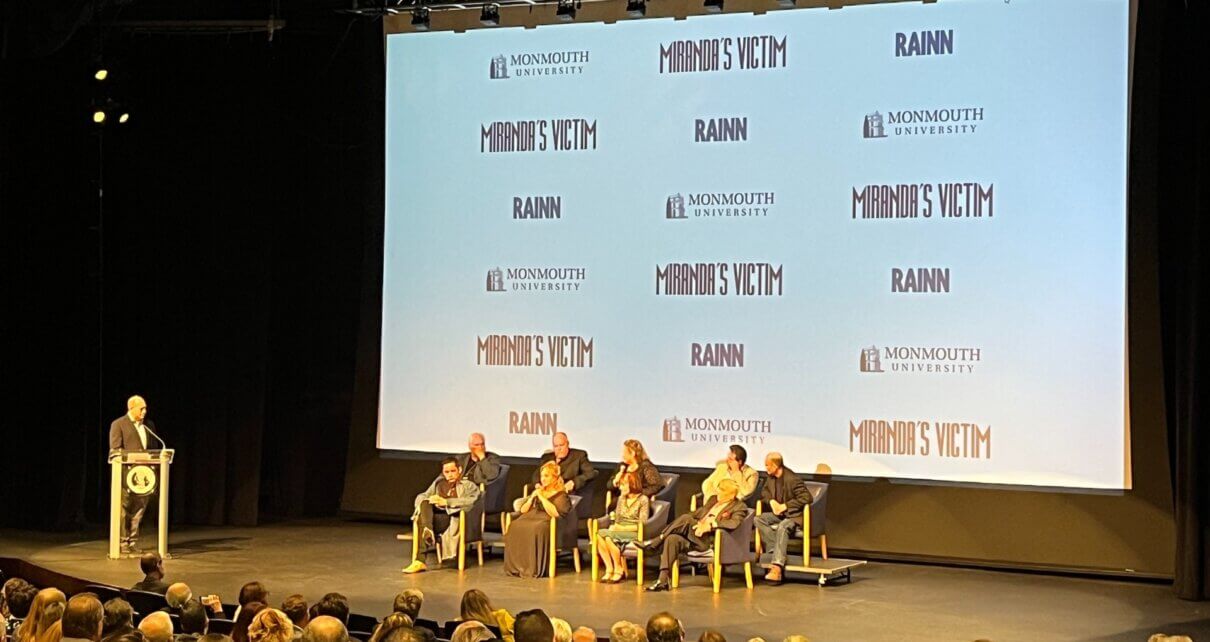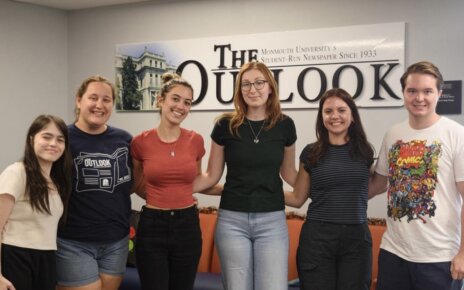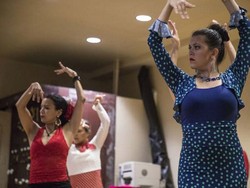Monmouth University’s Pollak Theatre hosted an advanced screening of Miranda’s Victim on the night of Saturday, Sept. 30, followed by a panel discussion with the movie’s cast and crew. People arriving at the event were welcomed by vintage cars that were used in a movie, showing guests a peek into life in the 1960s as well as what the set was like for the film.
The event was moderated by Scott Berkowitz with stars and crew from the movie taking their place on stage. In order of appearance, the stage seats were filled by producer Brian Drillinger, John Buffalo Mailer who portrayed Andrew, producer Valerie Debler, Brent Sexton who portrayed Sergeant Nealis, Michael Mulheren who portrayed Judge McFate, Enrique Murciano who portrayed Carol Cooley, and coming out last together were Michelle Danner and Patricia Weir, the movie’s director accompanied by the real-life woman who took Ernesto Miranda to court twice and helped create the Miranda rights. Their entrance brought about a standing ovation from the crowd.
The panel focused on movie-related questions as well as behind-the-scene takes on how the movie was made and what went into it. Berkowitz started the night by asking, “Why did you make this movie?” One member of the panel mentioned that this movie was an “important story to tell” and that this story was one that had never been told before in film.
Berkowitz continued by asking Michelle Danner about what drew her to the project. She responded by saying she likes crime stories, much like her last film The Runner. She explained that the opening scene of The Runner has someone reading out the Miranda rights, which made her curious as to where these rights originated from. “It’s incredible to find a story that has never been told,” reflected Danner.
Following that conversation, Berkowitz was curious about the atmosphere on set because of the serious topic of the movie. Danner discussed how the cast and crew felt “the responsibility about wanting to tell the story right.” Debler added that the actors knew the weight of the story they were telling, but they didn’t let that affect the overall mood of the set. Danner continued to explain the scenes they filmed in the Great Hall with her “wonderful cast” and how Monmouth University “opened [their] doors to us in such a generous way.”
After these questions, Berkowitz narrowed in on certain members of the panel to hear their own experiences about the movie. He talked to Murciano about how to prepare for a role that is based on a real person. To this, Murciano responded by saying that he plays “every character like they are real people,” but this time, he played a character that had an incredible impact on the world. Murciano called his character a “hero;” not one like a character in a Marvel movie, but a “real hero.” Murciano ended his commentary by addressing Weir personally, saying, “Every word of my performance [is for] you.”
After Murciano, Berkowitz addressed Drillinger, asking what brought him to the movie. Drillinger explained how he admired the cast and crew of this movie for getting on board the project, telling “a story that needed to be told,” and not signing on for any personal gain. Drillinger shared his admiration for the cast of this movie as well as towards Monmouth for their continuous support of the project.
Mulheren mentioned that, for him, the best part of this movie was getting Weir there with them on set while Mailer described signing on because this movie is based on such an important event that “gets to the heart of our legal system.” He finished his time on the mic by praising Weir, as well.
Finally, Weir came to the mic after being asked about what motivated her to go to the courtroom twice during her trial. Her answer was plain and simple: “I wanted him to pay for it.” She discussed being a survivor of sexual assault and shared a message for all other survivors out there, urging them to “report it. These guys should not be able to get away with what they have done… they should pay for what they have done.” This response brought about an applause from the audience.
Danner concluded by saying that this was a “story about being brave.” She noted the text at the end of the movie that says for every 1,000 crimes there are five convictions. “Come forward and seek justice,” she urged.




